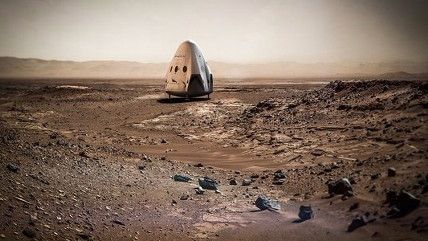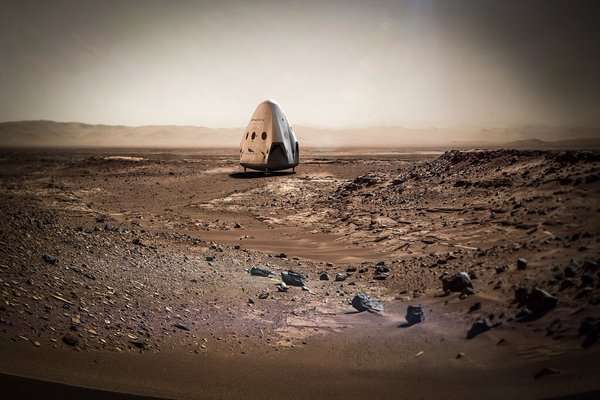SpaceX Foots the Bill for 2018 Mission to Mars
Elon Musk is working with NASA to hustle an unmanned mission to the Red Planet. But he's writing the checks.

SpaceX announced plans to send an unmanned capsule to Mars by 2018 on Twitter yesterday:
Planning to send Dragon to Mars as soon as 2018. Red Dragons will inform overall Mars architecture, details to come pic.twitter.com/u4nbVUNCpA
— SpaceX (@SpaceX) April 27, 2016
Right now, Dragon capsules ferry cargo to the International Space Station as part of a $5.5 billion contract with NASA. But SpaceX founder Elon Musk has made it clear that the capsules are built for more than just hauling shipments of astronaut ice cream, tweeting that "Dragon 2 is designed to be able to land anywhere in the solar system. Red Dragon Mars mission is the first test flight….But wouldn't recommend transporting astronauts beyond Earth-moon region. Wouldn't be fun for longer journeys. Internal volume ~size of SUV."

Veronique de Rugy labels Musk a crony capitalist in her column today, noting (quite correctly) that companies he has founded have received many billions in federal taxpayer dollars, state incentives, and more.
But it's worth highlighting that for this ambitious 2018 mission, Musk is footing the bill—despite some warm, fuzzy press releases about partnering with NASA.
One might consider some of those private funds his firm is spending on the mission ill-gotten gains, I suppose. But SpaceX has delivered the services it promised for those NASA billions so far; though not without the occasional mishap. And the company has done so under a type of contract that keeps much more of the incentives to behave like a profit-maximizing private actor (rather than an old-school appendage of the bloated space agency, like Boeing or Lockheed) intact.
The Washington Post reports that NASA will providing only "technical assistance" for this first unmanned mission to Mars, quoting space historian John Logsdon saying that "NASA has more expertise in getting to and landing on Mars than any other organization in the world….So if a U.S. company wants to try it on a no-exchange-of-funds basis, why not?"
For a while now, Musk has been beefing with science celeb Neil deGrasse Tyson about whether a Mars mission is an appropriate undertaking for a private entrepreneur. Last fall, Tyson said "The delusion is thinking that SpaceX is going to lead the space frontier. That's just not going to happen." Calling a Mars mission too time-consuming and expensive, Tyson declared: "A government has a much longer horizon over which it can make investments."
But, as space journalist Alan Boyle notes in GeekWire, Musk seems perfectly cheerful about the expense and rather more optimistic than Tyson about the time horizon. He's been pretty clear about how he hopes to overcome commercial pressure to think short term—the company will remain privately held for now.
"When we're doing regular flights to Mars, that might be a good time to go public," he said. "But before then, because the long-term goals of SpaceX are really long term—it takes a long time to build a city on Mars—that doesn't match with the short-term time frame of public shareholders and portfolio managers that are looking at the two- to four-year time horizon."
In other words, Musk thinks that this insanely huge undertaking will be good for his business in the long term. So much so that he's putting up cash now and delaying the big payday that would come with going public.
And frankly, it's hard to doubt the sincerity of a man who has said repeatedly over many years that he hopes to die on Mars (though ideally not at the point of impact).


Show Comments (72)